Profile
Delma Childers
Well everyone, it's been fun! Thank you for the excellent questions and I hope you stay tuned throughout Tim's mission to learn more about space and science! And have fun watching the new Star Wars this week!
Curriculum Vitae
-
Education:
Schreiner University (2003-2006; Kerrville, Texas, United States); University of Texas Health Science Center at San Antonio (2006-2012; San Antonio, Texas, United States)
-
Qualifications:
Bachelors of Science in Biology; Ph.D. in Microbiology and Immunology
-
Work History:
Research Fellow at University of Aberdeen researching yeast that cause infections, Student Associate researching HIV/AIDS infection and progression at University of Texas Health Science Center at San Antonio
-
Current Job:
Postdoctoral Research Associate and part of the Scientific Development Team for a future ISS microbiology/astrobiology experiment (BIOROCK)
-
Employer:
University of Edinburgh – School of Physics and Astronomy
-
My work
I investigate how some of the smallest forms of life (bacteria) adapt and grow in space.
-
Read more
Astronauts carry trillions of cells that aren’t their own into space. These cells are often harmless bacteria, but it turns out that microgravity, or the free falling weightlessness experienced by astronauts, can cause bacteria to do interesting things. Some of these bacteria form better communities (biofilms) in space than on Earth. This can be quite a problem for space station cleanliness and is a concern for the health of astronauts. However, we study bacteria that perform a very useful task – they mine iron and other elements from rock. We’re trying to see if our bacteria (Sphingomonas desiccabilis, Cupriavidus metallidurans, and Bacillus subtilis) also form better biofilms in space. We think better biofilms might improve bacterial mining. This is all part of an experiment for the International Space Station called BIOROCK. If we are right, we can start looking at using these bacteria for potential mining operations in space (asteroids!) or in life support systems that need element/ion scavenging.
-
My Typical Day
Drinking coffee, emailing colleagues, experiments in the lab, teaching students
-
Read more
Coffee is the essential start to my day. Depending on how experiments are going, I’ll email our BIOROCK colleagues in Germany, Belgium and Denmark to update them and check on their experiments. I do a lot of experiments in the lab that are getting BIOROCK ready to fly and I do a little teaching on a course with Physics undergraduates.
-
What I'd do with the prize money
I would go on classroom visits and put the rest toward our Astrobiology Summer Academy for teachers.
-
Read more
Every summer the UK Centre for Astrobiology holds an Astrobiology Summer Academy for teachers in Edinburgh that goes into what Astrobiology is and how to include Astrobiology lesson plans or activities in different parts of the science curriculum. This has drummed up a bit of interest in having some of our scientists come out to more schools in England and Scotland for classroom visits to do hands-on Astrobiology activities with students, but funds for visits are pretty limited.
-
My Interview
-
How would you describe yourself in 3 words?
Hopeful, Smart, Determined
What was your favourite subject at school?
Astronomy. Our class was held in a planetarium, which was amazing.
What did you want to be after you left school?
Exactly what I am now – a scientist.
Were you ever in trouble at school?
No. Not even a single detention. I was either really good or really lucky.
What is the most fun thing you've done?
The Vomit Comet (parabolic flight that lets you experience 22 seconds of weightlessness). We had an awesome opportunity to perform an experiment that needed to be done in weightlessness. And we didn’t vomit!
-
-
Work photos:
This is my first check-in point at work – my desk where I’ll have a cup of coffee and do a quick catch up on email.
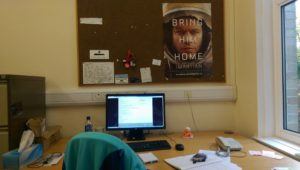
Then I hit the lab to check on my experiments and setup some new ones. So here we have the lab as you see it when you first enter
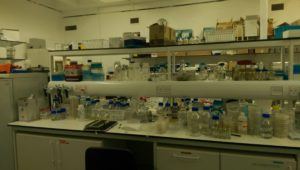 followed by my (messy) bench.
followed by my (messy) bench. 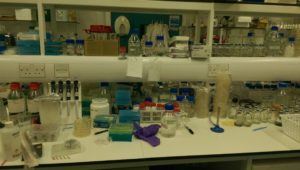 My bench has the typical tools you’ll find on most microbiologists’ workbenches as well as lots of chemicals, bottles, and tubes of samples from my experiments. My notes for how to do a couple of different experiments (we call these protocols) for today are taped above my bench. These notes and the results for these experiments will all get written down in an official lab notebook. This all helps me keep track of what questions we’ve answered in the lab and what new questions have come from our observations.
My bench has the typical tools you’ll find on most microbiologists’ workbenches as well as lots of chemicals, bottles, and tubes of samples from my experiments. My notes for how to do a couple of different experiments (we call these protocols) for today are taped above my bench. These notes and the results for these experiments will all get written down in an official lab notebook. This all helps me keep track of what questions we’ve answered in the lab and what new questions have come from our observations.I mentioned getting to do experiments on the vomit comet earlier – that was so much fun! A few Ph.D. students and I were in beautiful Bordeaux, which was a nice working break from the lab in Scotland.
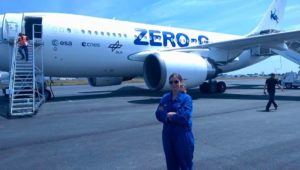
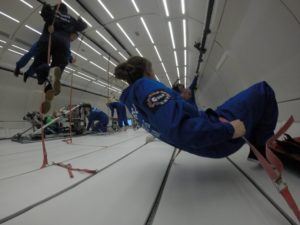 The vomit comet flight went through 31 parabolas, which is a maneuver that gave us about 22 seconds of weightlessness. So that’s 31 parabolas x 22 seconds – this equals about 11 minutes total. Tim Peake will easily beat my 11 minutes of weightlessness during his trip.
The vomit comet flight went through 31 parabolas, which is a maneuver that gave us about 22 seconds of weightlessness. So that’s 31 parabolas x 22 seconds – this equals about 11 minutes total. Tim Peake will easily beat my 11 minutes of weightlessness during his trip.
